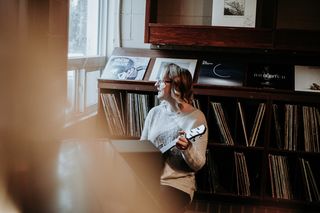Psychology
What to Do When You’re Cut Off From Your Musical People
Even the most social musicians can better themselves while distanced.
Posted April 1, 2020

Not many people claim to be “self-taught musicians.” Even among those who do, a look at their background usually betrays that notion; although they may not have received formal music lessons, they did benefit from the support of people in their lives and from the contributions of musicians who came before them. When Aristotle asserted that human beings are by nature “social animals,” he very well could have been talking about musicians.
In this post, I will make the case that a time of social distancing and home seclusion can be a great occasion to work on aspects of musicianship that are supported by isolation and an individual’s focused concentration. I will not, however, call being cut off from other musical people an “opportunity” or a “blessing in disguise.” Sociality is practically a defining characteristic of music. Considering how human beings have done and continue to do music throughout history and all around the world, we must conclude that music is at its heart cooperative, communal, and collaborative. Most would agree that their own personal experiences support the idea that music is at its best when it facilitates people sharing of themselves, interacting, bonding, and collaborative creating together artistically.
There are times, though, when musicians are cut off from their musical people. Whether it’s an infectious disease pandemic that necessitates social distancing, or just young musicians who find themselves on a family vacation far away from their musical peers, it can be frustrating to be separated from the musical subculture that normally contributes so much to the musical advancement of its individual members.
There are, however, certain music-making activities that lend themselves well to a setting of isolation. There are ways you can advance your musicianship greatly. In this post, I suggest three things you can do to grow musically when you're cut off from your musical people: practice, listen and watch recordings, and broaden your musicianship with individual creative music-making.
Practice
Practicing may not make perfect, but it is still the single best predictor of performance skill, according to psychological research. But make no mistake, all practice is not created equal (Ericsson & Harwell, 2019). In the music psychology courses I teach, I define deliberate practice as an effortful and concentration-heavy activity, done in isolation, that is specifically designed to accomplish improvement by focusing on skill deficits.
Based on this definition, it’s easy to see why deliberate practice accomplishes the difficult work that’s often needed for advanced musical growth. And as I’ve said elsewhere, it’s also easy to see why many would-be musicians can never seem to get themselves to do much deliberate practice: “it’s hard, it’s lonely, and forces you to think about your shortcomings!” (Woody, 2019, p. 43).
If you are a musician who has never done much isolated individual practicing, you definitely should check it out. Getting results from practice does require work, but you can lighten the burden with a few basic steps. First, in advance of any practice session, identify for yourself the purpose of it, in terms of the performance skill you wish to improve. Secondly, deliberately select a strategy to accomplish the skill improvement. And finally, adopt the attitude of a musical investigator or explorer, and immerse yourself in the “thrill of the hunt” as you pursue the skill improvement you seek.
Listen to (and Watch) Recordings
As productive as deliberate practice can be, it most certainly cannot be the only musical activity one engages in. Practicing the performance of music (and performance itself) will only contribute to musicians’ growth if it is supported by the necessary underlying musical cognitions, specifically having a clear mental idea of what the music is supposed to sound like.
Music is first and foremost an aural art. In other words, the “stuff” of music is sound, and hearing is how we people handle sound. The ability to precisely hear and mentally represent sound is absolutely critical for all musicians. Yet, there are some subcultures in which musicians do very little listening to the kinds of music that they perform (Woody, 2011). Among some, there exists an almost superstitious belief that too much listening to other people’s music will somehow harm a musician’s own ability to be individually artistic or creative. (I don’t agree with such thinking, but to be clear, I also do not advocate that advanced musicians listen to the same single recording in mass amounts like some local karaoke heroes are known to do.)
The idea that too much listening can hinder musical development is not supported by psychology. In human development, it is known that receptive skills precede productive skills. This includes in music development, in that listening to music necessarily precedes making music (Lehmann, Sloboda, & Woody, 2007, Ch. 2). Applied to child development, we know that toddlers will not try to sing melodies themselves until they have heard melodies sung to them many times. And in the development of advanced performance skills, it follows that a musician cannot perform with virtuosic fluidity and expressivity without the music cognition to support it, namely having a very precise idea of what such a performance should sound like. Such advanced aural skills are best built through a lot of music listening.
Listening to audio recordings of music and watching video recordings of live performances are a great way to raise your musical expertise. All that you take in from such recordings is added to your musical knowledge base which you will bring with into your next practice session, group music-making activity, or performance gig. A music graduate student once admitted to me that there was an attitude among some classical pianists that “Time wasted listening to music would be better spent practicing.” I, of course, disagree and contend that time spent listening to music is most assuredly not wasted time. Rather it is a very real way to make your practicing more productive and your performances more well-informed and expert-like.
Broaden Your Musicianship With Individual Creative Music-Making
Some kinds of music-making lend themselves especially well to isolation. This includes traditional “classical” composing and personal songwriting. Creating original music can be especially empowering to musicians as they reflect on what is personally important enough to them to try to express through music. Certainly some solitude and privacy can facilitate this kind of soul-searching and creative expression.
Even staunchest self-designated performers can improve their musicianship by doing some composing or songwriting. This may seem counterintuitive to musicians in certain musical circles, in which the value of specialization is accepted as fact. It’s better to be great at one thing, than be just pretty good at a lot, right? In a previous blog post, however, I looked at how some within psychology are challenging the rule of specialization for all domains of skill development. For my part, I believe that all musicians can gain something from composing/songwriting experience.
Virtually all performed music is composed by someone: if not by the performers themselves, then by someone else. Musicians who perform music written by someone else can surely gain insight into the mind of a composer by having composing experiences of their own. A university music student, reporting on a songwriting assignment she did as part of a class of mine, once described the experience this way: “It was a tool for accessing music in a way that I have never encountered before, and therefore allowed me to tap into a new creativity within myself that I didn't know existed!” She speculated that if all music students had composing experiences, they would approach performance from more of an “informed perspective.” Another student in the same class reported that he “had never seen so many of his peers so personally and emotionally invested in their music-making” as when they performed what they had written themselves. He said it “sparked a musical curiosity that led directly to self-driven learning and a new appreciation for music” (Woody & Bazan, 2009).
These testimonials underscore the idea that a boost in musical creativity does not just benefit those who want to be composers or songwriters. A more creative musicianship also can deepen the perspective that all bring to their music activities.
Whether musicians’ seclusion is self-imposed or advised by health officials, it can provide an occasion to do some individual work on their musicianship. For some, this will not feel natural, as sociality and collaboration are normally a defining characteristic of their musical experiences. This does not mean that they should not try to do it. Musicians should seek to expand their “toolbox” of growth strategies. Optimal musical growth likely includes activities that are both individually done and carried out in groups. For example, popular musicians who accomplish most of their musical growth through informal group activities often reach a point of commitment to their craft when they choose to carry out conscious and intentional practicing on an individual basis (Smart & Green, 2017). And on the other side of the continuum, among young musicians who grow up squarely in a formal educational paradigm (e.g., private lessons and individual practicing), research indicates they are advantaged by the inclusion of informal music-making and social contact with musical peers (Moore, Burland, & Davidson, 2003).
Copyright 2020 Robert H. Woody.
References
Ericsson, K. A., & Harwell, K. W. (2019). Deliberate practice and proposed limits on the effects of practice on the acquisition of expert performance: Why the original definition matters and recommendations for future research. Frontiers in Psychology, 10. doi: 10.3389/fpsyg.2019.02396
Lehmann, A. C., Sloboda, J. A., & Woody, R. H. (2007). Development. In Psychology for musicians: Understanding and acquiring the skills. New York: Oxford University Press.
Moore, D. G., Burland, K., & Davidson, J. W. (2003). The social context of musical success: A developmental account. British Journal of Psychology, 94, 529-549.
Smart, T., & Green, L. (2017). Informal learning and musical performance. In J. Rink, H. Gaunt, & A. Williamon (Eds.), Musicians in the making: Pathways to creative performance (108-125). Oxford, UK: Oxford University Press.
Woody, R. H. (2019). Becoming a real musician: Inspiration and guidance for teachers and parents of musical kids. Lanham, MD: Rowman & Littlefield.
Woody, R. H. (2011). Music listening in the personal and professional lives of university music majors. Contributions in Music Education, 38(2), 11-28.
Woody, R. H. & Bazan, D. E. (2009, June) Why include popular music in schools? Keynote address at the Popular Music in Education Symposium, Manhattan, KS.




